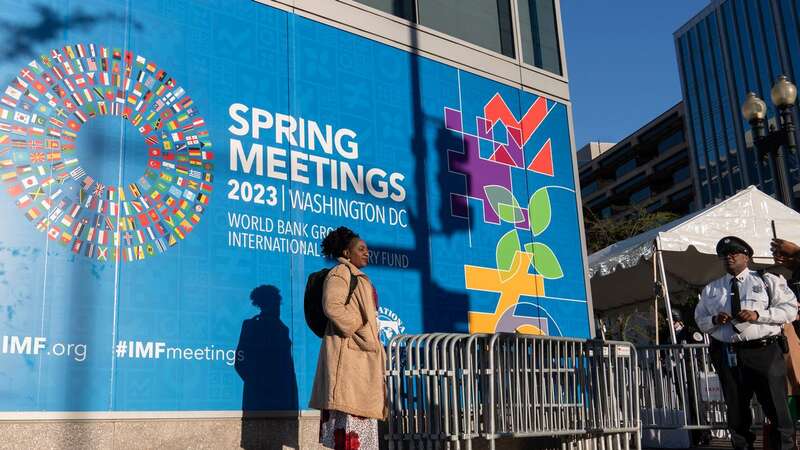
The International Monetary Fund (IMF) has upgraded its global economic forecast for this year, suggesting that we're on course for a "soft landing" which would mean cooling inflation with minimal economic disruption and ensuring steady, albeit modest, growth.
The IMF has slightly increased its projection for global growth to 3.2% for this year, a small step up from the 3.1% forecasted in January and consistent with the growth rate of 2023. It also anticipates maintaining this 3.2% growth into 2025. In its most recent report, the IMF, which supports 190 countries, highlighted that the global growth is being driven by stronger than expected performance in the United States, the largest economy globally.
The US is now expected to see a 2.7% increase in economic output this year, revised upwards from the 2.1% predicted earlier in January and surpassing the robust 2.5% growth seen in 2023. Despite persistent high prices posing challenges worldwide, the IMF predicts that global inflation will drop from 6.8% last year to 5.9% in 2024 and further to 4.5% in 2025.
Specifically, in advanced economies, inflation is projected to decrease from 4.6% in 2023 to 2.6% this year and reach 2% by 2025, as higher interest rates begin to take effect. The Federal Reserve, the Bank of Japan, the European Central Bank and the Bank of England have all significantly increased rates with the goal of reducing inflation to around 2%.
In the United States, annual inflation has dramatically fallen from a peak of 9.1% in the summer of 2022 to 3.5%. However, US inflation continues to stubbornly exceed the Fed's target level, which will likely postpone any rate cuts by the US central bank.
 Britain faces the worst recession among G7 partners, economists predict
Britain faces the worst recession among G7 partners, economists predict
Worldwide, it was widely anticipated that higher borrowing rates would inflict severe economic damage - even a recession - including in the United States. But this hasn't occurred. Growth and employment have persisted even as inflation has slowed down.
"Despite many gloomy predictions, the global economy has held steady, and inflation has been returning to target," Pierre-Olivier Gourinchas, the IMF's chief economist, informed reporters ahead of the release of the fund's latest World Economic Outlook.
Although the global economy is demonstrating unexpected resilience, it isn't exactly robust. From 2000 through 2019, global economic growth had averaged 3.8% - considerably higher than the 3.2% IMF forecasts for this year and next. Factors restraining the world 's growth prospects include the continued high interest rates, sluggish productivity gains in much of the world and the withdrawal of government economic aid that was introduced during the pandemic.
The IIMF has issued a warning that the ongoing economic expansion could be derailed by the persistent negative impacts of higher rates and geopolitical tensions, including the Gaza war, which pose a risk to trade and could lead to increased energy prices.
China, the world's second-largest economy, is grappling with a collapsing real estate market, low consumer and business confidence, and escalating trade disputes with other major nations. The IMF predicts that China's economy, which used to consistently produce double-digit annual growth, will decelerate from 5.2% in 2023 to 4.6% in 2024 and further to 4.1% next year.
However, on Tuesday, Beijing announced that China's economy grew at a faster-than-expected rate in the first quarter of this year, driven by policies designed to stimulate growth and stronger demand. Official data reveals that the Chinese economy expanded at an annual rate of 5.3% from January to March, exceeding analysts' predictions of approximately 4.8%.
Japan, now the world's fourth-largest economy after losing its third place to Germany last year, is projected to slow down from 1.9% last year to 0.9% in 2024. For the 20 countries using the euro currency, the IMF anticipates a modest growth of just 0.8% this year - weak but twice the eurozone's expansion in 2023.
The United Kingdom is predicted to experience slow economic progress, with growth increasing from 0.1% last year to 0.5% in 2024 and 1.5% next year. In the developing world, India is predicted to continue its growth trajectory over China, although the expansion in the world's fifth-largest economy will slow down from 7.8% last year to 6.8% this year and 6.5% in 2025.
The IMF anticipates a steady but slow acceleration of growth in sub-Saharan Africa - from 3.4% last year to 3.8% in 2024 to 4.1% next year. In Latin America, the economies of Brazil and Mexico are expected to decelerate through 2025. Brazil is likely to be hobbled by high interest rates and Mexico by government budget cuts.
Read more similar news:
Comments:
comments powered by Disqus































